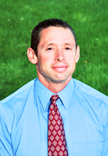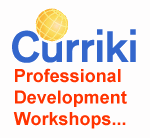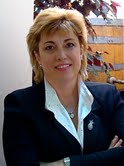 Zack Moore is this month’s Featured Teacher and he has a very interesting background! Learn more about Zack’s approach to teaching and his interests in our interview below.
Zack Moore is this month’s Featured Teacher and he has a very interesting background! Learn more about Zack’s approach to teaching and his interests in our interview below.
First, a bit about Zack Moore…
Zack currently teaches middle school science and math at the Laguna Blanca school in scenic Santa Barbara. He previously taught at the American Nicaraguan School in Managua, where he developed curriculum and taught physics, conceptual physics and earth science. Prior to his foray in Central America, he taught physics, physical science and mathematics at both Gateway Charter and Burton High Schools in San Francisco, and served as an 8th grade chemistry instructor for the MAGIS Summer Program for underrepresented youth in the Bay Area. He initiated his teaching career serving in the Peace Corps. He was posted to Ghana, West Africa, where he headed up both a secondary school physics department as well as the physics department for a Regional Science Resource Center for five school districts.
If you could give a TED talk, what would it be about?
I would probably choose a talk in my area of interest which is differentiated learning. Differentiated learning is all about creating multi-level lessons that reach students on a variety of levels to meet their individual needs – so that your top performing students still feel challenged, and your lower performing students don’t feel like they’ve been left behind.
While there are many talented teachers, there are also a large number of teachers who are not fully trained to teach a wide range of learners. Differentiated learning is not just about classroom management, it’s almost an art form – the ability to create lessons that can cater to all students’ needs.
Why do you use Curriki?
I like Curriki because I don’t have to “recreate the wheel” when I’m looking for a resource. If someone has already created a similar lesson, I can use it as-is, or adapt it, and not have to start from scratch. Plus, I get a completely different perspective if another teacher has created a lesson in a whole new way. By seeing what other teachers are doing, I can really expand my horizons.
What is Curriki’s best kept secret?
Curriki resources are being created every day in real time, and I like the fact that I can modify someone else’s work to fit my needs or add them to my own resources to create custom teaching tools.
What advice would you give to new teachers?
Don’t act as if you’re on an island! Get other teachers in your classroom, and get in other teachers’ classrooms – be observed. And don’t take their feedback with a critical slant. Many new teachers are blindsided by the amount of work involved, as well as the lack of collaboration in certain schools which can really stymie teachers in the first few years.
[Curriki note: There are nearly 700 Curriki groups you can join to exchange ideas, best practices, and curricula with other educators around the world. Groups like New Teachers or Technology Integration. Join a Curriki Group today.]
What’s the first website you check every day?
http://www.Surfline.com which gives surf reports – information on swells and winds. [Note: Zack tries to spend most of his free time surfing and playing beach volleyball.]
Favorite Curriki resource you’d like others to check out?
I really like project-based math units that integrate real-world applications and creativity into lessons to make learning fun. My Project Based Pre-Algebra unit has an artistic slant to it, allowing students to excel in other areas outside of the straight mathematical component.
[Note: This unit received a Curriki Review System rating of 3-Exemplary and consists of games to accompany a 7th-8th grade pre-algebra course. We encourage you to review and rate it!]
What would you be doing if you weren’t in your current role today?
I have a structural engineering degree and am very interested in bridge design, so I’d probably be doing something in that area.
Name your favorite guilty pleasure.
There’s nothing I feel too guilty about, but I do love chips and salsa (not the healthiest food)!
Zack received his B.S. in Civil Engineering from University of North Carolina, Charlotte and earned his Masters degree in Multicultural Education from San Francisco State University, where he was a Peace Corps Fellow. He currently holds California Single Subject Clear Credentials in Physics and Math.








how we can measure the area of cross section by measuring diameter of a solid cylinder with vernier callipers……………………….plz teach me with observations and calculations……………
Magenta